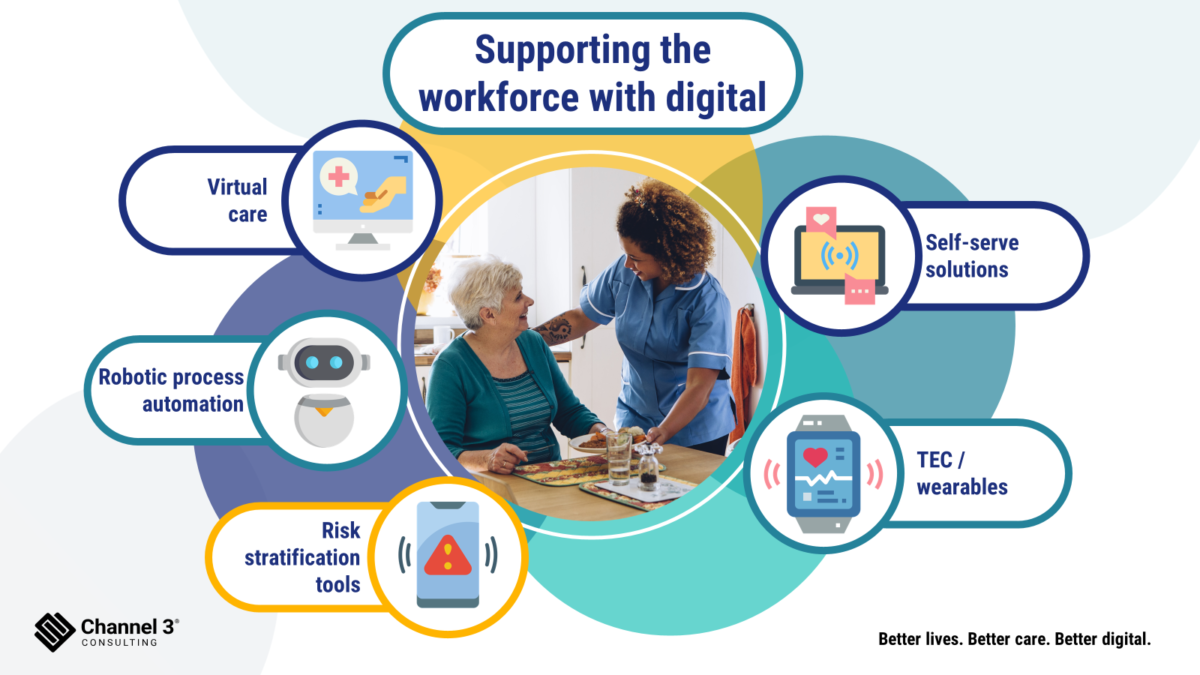First up was the topic of carers, which was covered Dr Emma Garland in her blog, Using digital to super-charge support for unpaid carers in the UK social care sector. This time, social worker and consultant Nyasha Fumhanda looks at the challenges surrounding the social care workforce.
Social care workforce – the challenge
Nine years in adult social care – as a carer, across domiciliary and residential settings, and as a social worker – have given me a firsthand look at the workforce crisis and its devastating impact on the sector. The evidence is undeniable: we’re simply understaffed to meet the needs of those who rely on us. People are living longer, but often with a declining quality of life, and increasing need.
The pressure on the profession is immense and often leads to burnout, with many (like me) taking a break from, or leaving, the profession altogether.
A career in social care is no longer attractive or competitive, which fails to attract or retain the skilled professionals we desperately need such as occupational therapists and social workers. Both local authorities and private providers grapple with this staffing shortage, which is a problem that only worsens as demand continues to rise.
Key social care workforce stats
- In 2022/23 there was a 10% national vacancy rate, equivalent to 152,000 vacancies.
- 2022/23 also experienced a staff turnover rate of 28%, equivalent to 390,000 leavers.
- To meet future demand, it has been estimated that the sector will need to recruit an additional 440,000 staff by 2035.
- The total number of posts required to meet this 2035 projection will be around 2,230,000!

Source: The state of the adult social care sector and workforce in England, published October 2023 (data correct as of 2022/23)
The social care sector faces a critical staffing crisis
Low wages are a major culprit, with some domiciliary carers earning less than the minimum wage due to unpaid travel time. Furthermore, limited career progression opportunities and a lack of investment in training and development leave front-line staff feeling undervalued and with little room for growth. Funding constraints force many councils to leave vacancies unfilled, even if they could attract potential employees.
The impact of this on the sector and the outcomes it can deliver for people is significant. Examples include:
- Burnout due to being overworked is rampant. This leads to increased sickness, poor mental health issues and poor wellbeing, which causes many to leave the sector.
- Reduced levels of service provision, eg staff managing higher caseloads or people left waiting for long periods to access the support they need. Workers are pushed further from the crisis-preventative model and must constantly react to crises and support people with the highest levels of need.
- An increased reliance on unpaid carers to prop up the health and care system, which isn’t sustainable (see our carers blog), as they are often not given the same priority as the cared-for person.
- The increased blurring of roles between social workers and community care officers, wellbeing advisers, and assessment and review coordinators can increase responsibilities, but without financial compensation.
- Higher use of agency staff and the associated costs related to a temporary workforce.
- Resources continuously invested in recruitment campaigns and placement fees, rather than care delivery.
- A shift in focus to attracting talent from outside the UK (72,000 people from outside the UK started work in direct care in 2022/23). Some workers are then not provided adequate support and training as there is the pressure to start allocating work to relieve pressures on existing staff immediately.
- NHS organisations (e.g. acute hospitals) setting up their own domiciliary care provision to help with hospital flow, which further undermines the ability of local authorities to attract and retain talent.
In short, we do not have enough people in adult social care to deliver the care that is required. This challenge is only set to get worse in the coming years. Something must change. The sector cannot continue to simply do more of the same.
How is the ASC sector trying to address the workforce challenge?
Skills for Care is leading a process to develop a workforce strategy for the next 15 years with leaders from across the sector, the regulators, the NHS and Education and Training. The Social Care Leaders Vision for a Future Workforce Strategy offers a preview ahead of the full strategy being published in the summer. It will take account of innovation such as digital and technology enabling people’s lives and the workforce. It also promises to incorporate the principles of the Care Act 2014 for the social care workforce: empowerment of people, prevention, proportionality, protection, partnership with services offering local solutions to their communities and accountability and transparency.
As the delivery of the strategy progresses, based on the conversations we have had across the sector, the role of digital will be an important one. Not necessarily a central role, where the sector is moulded around digital, but instead it will be infused throughout the progress that is made. Digital will be the strongest catalyst for addressing the sector’s workforce challenges.
There have been and are several government policy initiatives focused on addressing the social care workforce challenge for several years, which include:
- People at the Heart of Care Report (2021): outlined a strategy for workforce development and committed to invest £500m in the workforce challenge over 3 years.
- DHSC Policy Paper (2023): outlined the next steps to the 2021 report and established plans for a national workforce pathway, with an investment of £250m over 2 years.
- Made with Care Campaign: was established to boost recruitment into social care, which is now entering its second phase.
- Guidance on the Care Workforce Pathway for Adult Social Care (January 2024). This included a national care career structure with defined roles and professional development, a new accredited qualification and funding for hundreds of apprenticeships and digital training to embrace the latest technology.
These interventions are welcomed by a sector that continues to be under relentless pressure, but on their own they will not resolve the workforce challenge as demand continues to outstrip supply in the coming years.
How can digital help address the social care workforce challenge?
There is a wide range of digital solutions and interventions that can help address the workforce challenge in adult social care and the wider health system. Some of them directly impact the workforce, eg virtual care solutions improving staff productivity, work-life balance and wellbeing, whilst others have an indirect impact, eg front door self-serve solutions freeing up workforce capacity by reducing demand flowing into social care teams.
Delivered together as part of a holistic transformation approach, enabled by digital, these solutions can play a significant role in helping to address the workforce challenge whilst improving outcomes for people.
Example digital solutions

Using digital solutions to enable virtual consultations with people at home or in their communities. Regular virtual consultations can help improve productivity, reduce the environmental impact of in-person visits and free up time for healthcare providers to visit and spend more time with patients who require in-person consultations. It can also help support the overall wellbeing of a wider group of patients and enable early identification of potential health issues that require intervention. Furthermore, virtual care can help improve the work-life balance and wellbeing of healthcare staff.
Using digital tools to automate administrative processes and remove the reliance on paper / people, to improve productivity and free up staff time. Digital social care records within care providers are a good example of RPA as are AI solutions that can produce a summary of a care visit / consultation to save staff time in writing up notes after each visit.
These enable staff to identify people most at risk who should be prioritised for support, helping to reduce the numbers of people going into crisis. They can be deployed to help manage waiting lists or to avoid specific demand types, eg falls prevention.
There are a range of digital solutions that can enable people to self-serve and access support without the need for input from social care. These include digital Information, Advice and Guidance (IAG) platforms and AI Chatbots that can facilitate strength-based conversations and signpost to community support.
These solutions can be deployed to help people self-manage at home or in their communities, whilst also providing new data insights to help inform preventative / proactive analytics and intervention. This in turn reduces the traditional reliance on people to people support.
This list is by no means exhaustive and, as we continue to reinforce at Channel 3, we must avoid focusing solely on the digital solutions at the expense of the wider people, process, operating model and transformation work that is required to deliver the benefits of these solutions. However, we should not lose sight of the positive impact these solutions can have in helping to challenge the traditional model of care and support, and in turn, help address the workforce challenge in new ways.
The potential impact of this on workforce productivity and the improved outcomes the sector can deliver for people is too complex to quantify – but we can be sure it will be transformative. Enabling senior health and care professionals to work in this way, may also be a way to prevent the droves of experienced staff leaving the profession that we see today. It will also be a way to attract the next generation of digitally savvy care professionals who are looking for something different to the traditional career paths and ways of working we foster today.
Next steps
As we look forward the workforce challenge will continue to add pressure to a system that is already at breaking point. It is right that the sector focuses on investing in the social care workforce – they will always be the bedrock of care and support provided and will never be replaced by digital solutions.
Yet, as we have outlined above, there is a range of digital solutions that can contribute to solving the workforce challenge and play a positive role in moving to a model of care and support that is much more sustainable and able to meet the demands being placed on the system. Moving to a digitally enabled workforce will help care professionals be more productive, whilst delivering improved outcomes for people.
If you would like to know more, please get in touch. We look forward to engaging with as many of you as possible and continuing to help deliver a digitally enabled future for social care.

